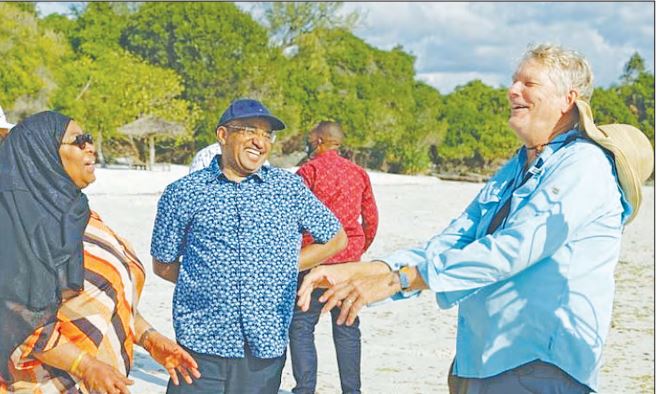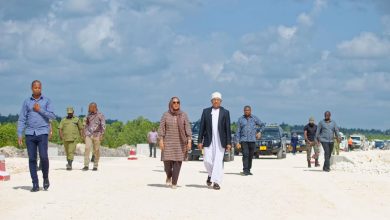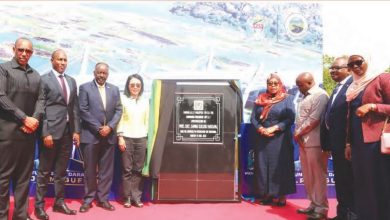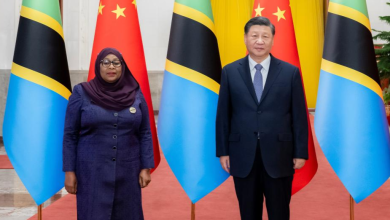How Mwinyi polishes the shining tourism star

ZANZIBAR: TOURISM industry, undeniably the pillar of Zanzibar’s economy, was already severely affected by the global COVID-19 pandemic when the then President-elect Dr Hussein Ali Mwinyi assumed office in November 2020.
But, five years later, the top foreign currency exchange earner is on its historical high.
The Principal Secretary in the Ministry of Tourism and Heritage Dr Aboud Suleiman Jumbe, in an interview with the DAILY NEWS, discloses the secret behind the rapid recovery and resilience of the tourism sector under President Mwinyi….
Q: How has Dr Mwinyi performed in tourism sector during his first five-year presidency term?
SURELY, everything speaks for itself. Let’s begin when His Excellency Dr Hussein Ali Mwinyi assumed office during a difficult time, not only in Zanzibar but globally.
It was a time when Covid-19 pandemic was ravaging people’s livelihoods, their health and security.
The pandemic had already triggered one of the largest global economic crisis and Zanzibar’s was not an exception.
The country’s GDP growth rate at that time of crisis had slowed to just around 1.3 per cent.
President Mwinyi’s first priority in office was to rapidly introduce a series of synchronised interventions, ranging from policy, institutional, social development and good governance reforms to enhanced economic innovation, investments, infrastructure and empowerment programmes.
The Zanzibar Development Plan (2021–2026) ushered in an historic turnaround towards an accelerated economic recovery for Zanzibar.
Thankfully, today, when President Mwinyi seeks another term in office, Zanzibar is enjoying a booming annual economic growth in terms of GDP to just above 6.8 per cent by mid-2025, a continued lowering of inflation rate to below four per cent, with record breaking annual revenue increase towards 1.6 million US Dollars in 2025 which is attributed to increased foreign direct investments and an expanding financial sector.
These achievements could not have come around without factoring in the greater role played by the tourism industry, incentivised private sector investments, infrastructure development and social empowerment programmes that were introduced right from the start.
If we recall, when Dr Mwinyi assumed office in November 2020, Zanzibar’s annual international tourist arrivals were just above 260,000.
But, as we speak, the islands have this year received a total of 950,000 tourists in the last nine months and, given the conventional figures between now and December 2025, the projections are now expected to put annual arrivals at over one million by the year-end.
It’s a great achievement. We have surpassed by far our annual target of 850,000 visitors and we can now confidently say that the next annual tourist arrival target of 1.5 million tourists towards year 2030 will be reached by the end of 2027.
Q: What has been the secret behind this admirable performance?
Dr Mwinyi’s bold and pragmatic decisions towards economic recovery, reforms and resilience.
The level of synchronised development interventions led by a combination of his visionary leadership, strategic planning and firm directives.
The firm belief on the potential post-pandemic opportunities that the tourism industry had in reviving the country’s economy inspired President Mwinyi to invest heavily in this strategic sectoral transformation that saw a quick recovery and a strengthening of the tourism sector through compatible and updated policies, guidelines, laws and incentives that have eventually been attracting foreign direct investments and private sector financing into the economy.
Of course, these strategic reforms, targeted investments and revitalised institutional partnerships have ushered in an inclusive growth that balances macro-structural investments with small, medium and micro-entrepreneurial empowerment programmes for the people under the Tourism for All strategy.
This has always been Dr Mwinyis’ vision of post pandemic Zanzibar and it has worked well.
Today Zanzibar is one of the top 10 African countries with busiest airports, high number of five-star hotel projects ranking her with other African tourism giants such as Egypt, Nigeria, Kenya, South Africa and Mauritius.
Don’t forget that Zanzibar now also competes with Bali, Maldives, Mauritius and Bahamas as favorite honeymoon destinations. We are now shifting towards high-end tourism.
As a result, we need to accelerate the transformation of our quality; both in terms of infrastructure and hospitality services.
A recent poll by a regional media group has identified a minimum of 10 high-end hotel-construction projects in Zanzibar by worldclass hotel and resort groups that will add up another 1,400 top-class rooms by 2027 under the five-star category.
Prior to this recent regional-based data, Zanzibar’s tourism sector is already growing rapidly. By the end of 2020 Zanzibar had approximately 995 tourism-related projects.
By 2024 we had 1,695. These projects include mainly in tourist hotels, restaurants, conference halls, souvenir shops, excursion destinations, beach and marine sports, touroperated service.
We have as well witnessed an increase of high class four and five-star hotels in Zanzibar from an average of 50 in 2020 to over 80 in early 2025 as giant international tourism companies continue to pick Zanzibar as their next favorite destination.
We now target to increase the number of standard rooms to 10,000 in the near future. When we say standard, we mean rooms that are classified under the competitive hospitality services.
Zanzibar has now joined the Global Sustainable Tourism Council and our goal is also to be certified in terms of sustainability index, not just hospitality standards. We aim at first reaching 30 per cent by 2030 before we enhance further.
Even as tourism contributes about 30 per cent of the total GDP, it is no wonder that the contribution of tourism sector in jobs generation stands at over 50 per cent of all jobs in the country’s labour market, as per recent data from the Zanzibar Economic Empowerment Agency.
We should also note that tourism already provides almost 80 per cent of the Zanzibar’s foreign exchange earnings.
Q: What makes Zanzibar a destination of choice for tourists?
Historically, Zanzibar is a tourism hub though that alone might not suffice in this competitive era.
Remember, tourism is a competitive industry and right now, in the Indian Ocean alone, we are fiercely competing with other giants, including Sri Lanka, Maldives, Bali, Reunion, Seychelles and Mauritius.
Even though their tourism sectors are at an early stage, Madagascar and Comoros are also beginning to compete. But, through strategic plans, Zanzibar is faring well and the future is bright.
President Mwinyi has already issued a vision and directives to widen the coverage of tourism sector in the country. We call it diversification of tourism products which include cultural, historical, heritage, sports, conference, cruise ship and wellness tourism.
We are now receiving an increasing level of interest in wellness tourism. But in order to ensure our success, President Mwinyi has already put in motion long-term investment programmes such as empowerment of the local population in terms of training and skills development, innovation in hospitality and micro-entrepreneurism that help generate jobs, empowering our people through access to the right tools, access to capital, local and international markets.
We know that by supporting your people, many of whom are youths who engage tourism industry with a high degree of confidence, they acquire the ability to engage professional services with strong skills and innovation.
Sustainability and tourism for all are central for the industry’s prosperity.
The government is currently putting great emphasis on heritage tourism especially in enhancing the status of the famous UNESCO-listed Stone Town.
There is a huge investment in care, preservation and development of all these historical and heritage sites inside the Stone Town and around the archipelago for the current and future generations.
We are working with several development partners and the private sector to augment the status of our heritage tourism industry.
The government perceives tourism as a sensitive profession that requires training and exceptional skills.
We are in the process of transforming the Zanzibar tourism college to become one of the giant training colleges that are widely recognised, globally.
We want to train our youths and make them highly competent and employable both within and outside the country.
Zanzibar islands are no longer only a beach escape; they are also a living classroom, festival stage and unfolding story.
A strategic use of festivals and cultural events has helped to reset the Zanzibar brand.
Major annual tourism festivals have grown from three in 2020 to over ten this year, with flagships like Investment and Tourism; Organic Food festival; Kizimkazi festival; Zanzibar Holiday Market festival; the Halal Tourism festival; and Pemba Tourisport Bonanza and Culture generating visibility and income while celebrating Swahili culture, Islamic values, culinary heritage and local sports.
An increase in these events has supported the promotion of Zanzibar locally and at the regional and international platforms, fuelling an increase in tourist arrivals.
Q: Where is Zanzibar heading to in the next few years?
Definitely, we are targeting high-end tourism and product diversification.
The government is determined to intensify heritage, wellness, conference and sports tourism.
Our goal is to reach a point where Zanzibar brand will be at the centre of global travel and leisure platforms.
The standard of hospitality services and sustainability index must increase to attract more high class tourists.
And, the trick is simple, creation of friendly investment climate through policies, laws and various guidelines, which simplify investment procedures and attract investors in tourism sector.
The government has just embarked on strategic moves to promote Pemba Islands as a special investment and ecotourism destination, with the aim of attracting over 300,000 tourists by 2030 through promotion of the islands’ endowed cultural attractions.
Modern travellers are increasingly drawn to experiences that offer a deeper connection with nature and culture. Once overshadowed by Zanzibar’s main island, Unguja, Pemba is now earning its spot in the spotlight.
And, as its reputation grows, so does its accessibility, recent improvements in infrastructure, maritime and aviation transport connections have made reaching Pemba more convenient than ever. We are now developing the Pemba Tourism Masterplan.
The island’s rise as a destination is also supported by its eco-tourism nature-trail appeal.
Pemba has enormous untapped potential, especially in eco-investments; it has significant tourism potential, particularly in natural and cultural heritage tourism, diving and culinary and spice heritage.
Key attractions include its status as one of Africa’s top diving destinations, thanks to richness in marine life and underwater coral reef garden walls, an untouched greenscape above the hilly and undulating terrain that makes Pemba’s appearance as an elevated island of the archipelago very unique.
Q: Has the Royal Tour documentary and other Promotional films in any way impacted on Zanzibar’s tourism?
Absolutely! That was a brilliant idea that has yielded fantastic results.
Remember when Her Excellency President Dr Samia Suluhu Hassan and His Excellency President Dr Hussein Ali Mwinyi participated in the documentary series whose key focus was to promote tourism across Tanzania.
During the filming, our leaders also showcased Zanzibar’s attractions, including the islands’ rich heritage, beautiful coastal beaches and marine resources. We also had the famous Presidential Tour documentary that was aimed at attracting tourists from China.
Recently we have worked with an Indian company to produce another documentary called Tantalising Tanzania in order to attract tourists from India.
We have also featured in famous magazines such as Forbes, National Geographic and the Global Investor Magazine, to name a few. This month CNBC Africa launched Tanzania – The African Dream – documentary in Dar es Salaam.
These promotional examples align with Dr Mwinyi’s strategic vision of promoting the blue economy which envisages developing marine resources, including tourism to spur economic growth.
Sincerely, Zanzibar has received several international awards, accolades and citations for our tourism destination brand.
Q: Are ordinary Zanzibaris, in any how, benefiting from the booming tourism sector?
Of course, yes! Tourism is essentially for Zanzibaris. And, under President Mwinyi’s leadership, residents themselves can testify, ours is sustainable tourism for all, which is people centred, preserving cultural identity and heritage; safeguarding livelihoods and social security as well as investing in nature based and climate-resilient solutions.
The government goal has, besides attracting tourists, also been to benefit all Zanzibaris, including service providers like tour guides, fishermen, farmers and traders who supply to the tourist hotels.
Tourism for all, for us, means that everyone should benefit from the sector.
The government remains determined to continually build the necessary infrastructure and services to enable people to operate in a reliable and a tourism-for-all supportive environment.
Wananchi are widely supported through interest free loans and public awareness on effective participation in the huge business potentials in tourism.





